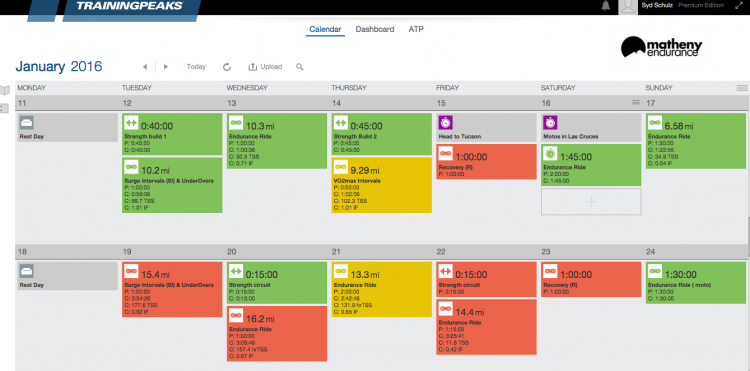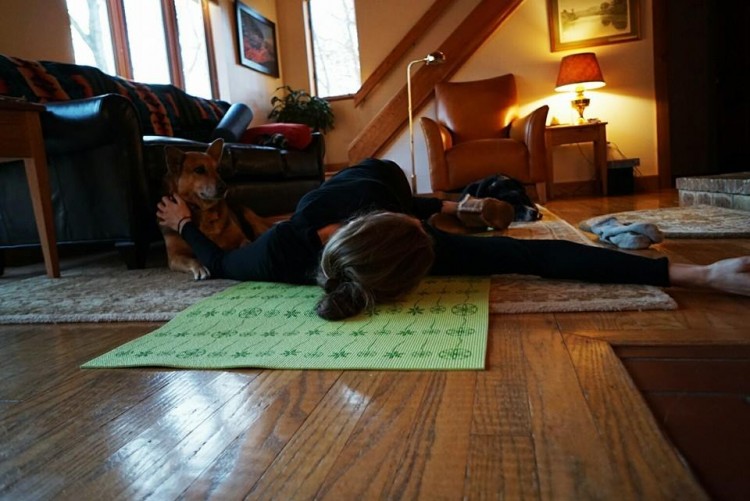Is Will Power Really Your Friend?
8 Feb 2016

The desire to have green boxes in Training Peaks is a powerful motivator.
When you tell people you’re a professional athlete, you often get responses like “wow, you must be disciplined,” or “I barely have the will power to make it to the gym once a week! How do you do it?” These kind of comments always make me a bit uncomfortable, because, um, me? Will power? Ha. Ha. Clearly you’ve never seen me eat chips and salsa.
Let me tell you a story. I used to be extraordinarily disciplined. As a high school athlete (and student), I was regimented, both in my thinking and my training. Things were very black and white and I was harsh on myself, my body and my seeming inability to achieve my (lofty and highly unrealistic) goals. I moved away from this thinking in college. And by “moved away” I mean, slingshotted to the opposite end of the spectrum. There was a long period of time where I couldn’t really be considered an athlete. In fact, being a serious athlete held for me a connotation of self-doubt and disappointment. I morphed into an extremely Type B person. Although I have changed a lot since college, I am still closer to that iteration of myself. Disciplined me was not a healthy or happy person, and even when I started moving towards racing enduro professionally, I knew I didn’t want to return to being that person.
Here’s what I’ve realized about will power — some athletes get where they are by pure force of will, determination and discipline. The rest of us have work-arounds. (And the former are not always the most funnest people ever to hang out with, but that’s just my opinion.)
Re-integrating serious training into my life over the course of the past two years has been a slow and deliberate process, in which I’ve tried to eliminate the role of “will power” wherever possible. Not because I can’t force myself to do something (goodness knows I can), but because I don’t believe battling my mind is the healthiest, smartest way to achieve my goals. I think there are other options, and if you’re like me and all that “ra-ra fitness just do it don’t be a pussy lift heavy shit” crap sets your teeth on edge, consider these bits of advice, instead.
Defer to the experts. (I.e. take it out of your hands).
I resisted serious interval training for the first two years of my professional career (pretty impressive run, eh?). Not because I didn’t want to do intervals, I actually kind of did, but because I was deathly afraid of over-training and/or working myself into a tizzy (a la my high school running career). Frankly, I didn’t know what to do. Starting last year, I started tossing around the idea of working with a coach. But oh dear, that would mean someone would be telling me what to do and part of the problem with being a very Type B person is that you prefer to decide your daily schedule you know, around 9am on the day in question.
In November of this past year, I finally pulled the trigger and starting working with Daniel Matheny of Matheny Endurance. Best decision ever. I quickly learned that the greatest thing about coaches is that they take the discipline out of your hands. If you know what you’re going to do ahead of time, it’s pretty easy to motivate yourself to do it. And if you’re feeling tired and sick and crappy, all you have to do is tell your coach that and they tell you NOT TO DO ALL THE THINGS. Whoa. Left to my own devices I gravitated between periods of being totally paralyzed by indecision and periods of “motivation” aka quasi psychotic training through injury and stomach flus and gail force winds. Working with Daniel has given me some much needed balance and peace of mind. And, actually, training is fun and feeling fit is awesome. (Go figure).

It’s a lot easier to train in weather like this if you go out the door with a plan.
Instead of forcing it, re-think it, and do it smarter.
I have a notebook where I record all my monthly goals and tasks. Since October I’ve been writing “do four parking lot skill sessions” and whaddayaknow I haven’t been doing it. I have plenty of excuses, mind, “it’s icy,” “it’s snowy,” “I don’t know where to find a parking lot” etc., but excuses shmooses, the point is, I wasn’t doing it. Previous me would probably have reacted to this with a slough of self-loathing, WHY CAN’T YOU MOTIVATE YOURSELF TO JUST DO IT WHAT’S WRONG WITH YOU WHY DO YOU NEVER DO THE THINGS YOU SAY YOU’RE GOING TO blah blah blah. Current me is a little bit nicer to myself, so I’ve been trying to figure out why I’m not doing it, instead of just assuming I’m a failure.
When the opportunity came up to work remotely with Lee McCormack of Lee Likes Bikes on skills training, it was a bit of a light bulb moment. Ahhh, I haven’t been doing this because I have no idea what I’m doing, not because I lack the motivation. I want to do it, but I don’t have the direction I need, so it’s not satisfying and I don’t feel the payback, and there’s this constant self doubt of “am I even working on the right things.” In other words, basically the same reason I wasn’t doing intervals. With Lee’s program, I receive lessons that tell me what to do. After I complete the lessons, Lee takes a look at the video and gives me some personalized feedback. I’ve only just started, but I’ve already begun to think about skills work in a completely different way.
Use routines and incentives to your advantage.
You can’t always hire an expert to tell you what to do, of course. Sometimes you have to buck up and do it, whatever it happens to be. There are some ways to make this easier and most involve removing will power from the equation to some degree or another. (Hint: will power not your friend in this scenario.) The more you can make a task a given, an expectation, a routine — the more likely it is to happen. I’ve managed to do this with my morning “yoga.” By yoga I mean 2 -3 sun salutations. I’ve convinced myself to do this for the past four or five months by being very, very, very reasonable with my morning, un-caffeinated self. Which is to say, I only have to do my yoga until the coffee is done brewing. Yes, okay, it’s not a lot of yoga, but now it’s something that I’ve gotten so used to doing, I keep doing it without much whinging and it’s a great way to start the day. Routines like this take a bit of will power to set up, but then your brain accepts it as something that just happens. The key is to be realistic (don’t say you’re going to do an hour of yoga before you drink coffee looooool) and to convince your brain that it’s a routine and that there’s no decision making involved.
The other trick is to use incentives. I really only recommend doing this in extreme cases — the things you absolutely HAVE TO DO, that require significant time investment (i.e. are too difficult to fit into a routine) and that you can’t work around. Personally, I’m of the mind that if you really, really, really don’t want to do something, you should take a good, hard look at why you’re doing it and maybe, ya know, stop doing it. But there are some things that you have to do so that you can do the things you love — for me, these are my PT exercises for my knee. God, I have the hardest time making myself do them. I don’t know why. They aren’t exactly difficult. But they are kind of time consuming and I only really feel the need to do them when my knee is already hurting (in other words TOO FREAKING LATE). Luckily I’m sucker for gold star stickers, so for the month of December I gave myself a star in my goals notebook for every time I did the exercises. Terribly hokey, I know, but it worked, and my knee now feels 100% better.

I’m working on establishing a better stretching routine but it’s a process.
Realistically, of course, even with the stars, doing my PT exercises required will power. The good news is that because I had eliminated the need for will power in my other training, I had a lot to spare. Because that’s the thing about will power — it’s finite. It can work for you, if used sparingly, or you can drive yourself up the freaking wall trying to battle your mind over every little thing. My thoughts on will power, boiled down to the absolute basics, are these: eliminate the need for will power and discipline where you can, be realistic, have experts give you direction, and, if worse comes to absolute worse, play tricks on your brain.
I’d love to hear from your — how do you balance and conserve your use of will power? What’s your winter training motivation? Shoot me an email or comment below!





